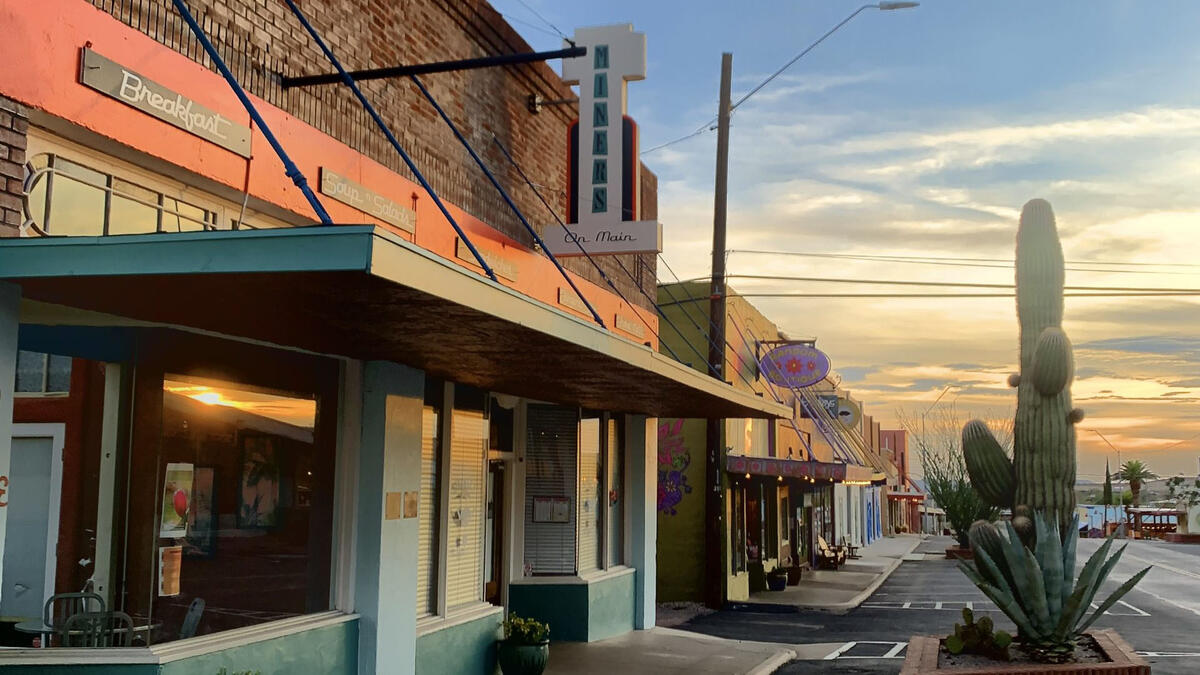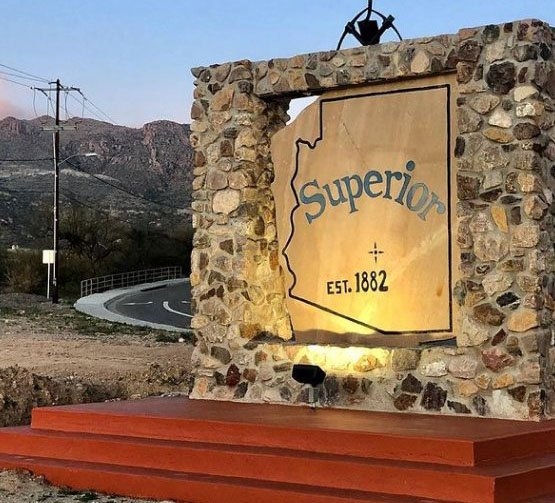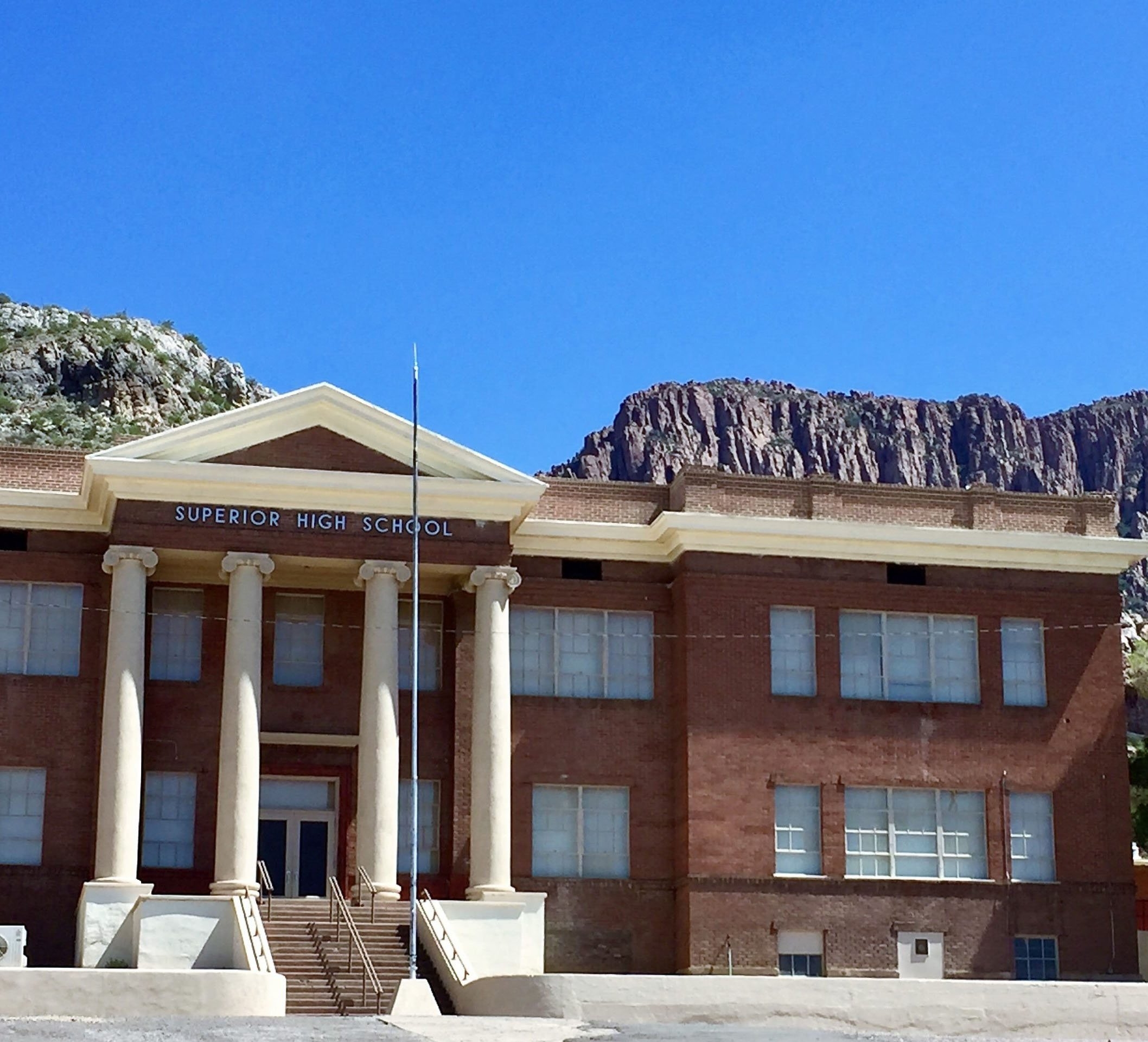ASU’s Lodestar Center reaches out to identify capacity for nonprofit work, charitable giving in rural Arizona

Main Street in Superior, Arizona, is part of the town's resurging business district. ASU experts are assisting the town and other rural Arizona communities in identifying the capacity for nonprofit and philanthropic entities to raise funds for community needs. Photo courtesy Superior Chamber of Commerce
While urban dwellers can easily exist in relative anonymity in their own neighborhoods, an often-cited advantage of rural living is being around people with a strong sense of place, who understand and look out for each other.
Mila Besich knows this well. A fourth-generation resident of the eastern Pinal County community of Superior (population 2,479 in 2021), she’s also the town’s mayor. In the 1980s, her family donated land on Main Street for Besich Park.
Besich’s town is at the center of an effort by Arizona State University’s Lodestar Center for Philanthropy and Nonprofit Innovation in the School of Community Resources and Development to discover rural Arizona’s potential to create and fund nonprofits to provide services to residents.
Lodestar Executive Director Robert Ashcraft, Saguaro Professor of Civic Enterprise, contacted Besich to identify opportunities for strategic nonprofit and philanthropic capacity building in Superior and statewide to advance rural communities’ well-being.
“What’s very clear is that across rural Arizona there is really a desire to engage, not only with our center, but to understand the range of opportunities there are in the nonprofit sector,” Ashcraft said. “Much attention is paid to the urban communities, where so much activity is happening. Increasingly in our center’s work, though, is the question, what about rural Arizona?”
Besich gathered representatives of several public and private entities, including the town itself, the local school district and chamber of commerce, and current and former residents. They are guiding the effort in Superior to continue the community’s ongoing revitalization, in part through soliciting contributions from donors who value the rural lifestyle.
Long history, new opportunities
Since its founding in 1882, Superior’s economy has primarily depended on mining. Since nearby copper mines closed in the late 20th and early 21st centuries, large numbers of residents moved elsewhere. Buildings and infrastructure began to deteriorate as town revenue dwindled.
Superior has enjoyed a recent, small resurgence, as many previously closed storefronts in its business district have reopened, including shops and restaurants, as well as the renovated, historic Magma Hotel.
Besich reasoned that if the town’s rejuvenation is to continue, it will need more money, not merely from public funds but also donations from individuals and others.
A charitable foundation, Rebuild Superior Inc., was formed. The mayor said she has a phrase she uses often: “rural by choice,” referring to people who want to live in a town like Superior and are willing to support it.
“Maintaining relationships is critical to make sure we are moving the community forward,” Besich said.
Town leaders and residents are crafting a plan to revitalize the community in part through a $2 million fundraising campaign to match a $2 million donation from Resolution Copper, which plans to open a new mine in the area.
Besich’s leadership to advance Superior aligns with Lodestar’s efforts, said Ashcraft. The center plans to expand on lessons learned in Superior by leading a larger strategic alliance of individuals and organizations building nonprofit and philanthropic capacity in rural areas.
“The center has always served rural nonprofit individuals and organizations. The idea here is to knit together willing partners in order for us all to be more strategic and impactful in our efforts,” he said.
The center’s work is part of its Service Enterprise Initiative, which it took over in partnership with the Points of Light Foundation in 2022 from the Arizona Governor’s Office of Youth, Faith and Family. In the transition, officials committed to ensuring rural Arizona is intentionally part of opportunities available through the center’s capacity-building portfolio.
First meeting in January identified needs, possibilities
A network of individuals representing organizations with statewide reach, each responding to an invitation by the Lodestar Center, first met in late January. The meeting was hosted by Besich in Superior.
One of the first things Ashcraft said he and the network members realized was that many rural Arizona communities have needs that philanthropy could help meet if only more donors were made aware of them.
“They’ve got quite an ambitious plan around the economic and social advancement of Superior, which was traditionally a mining community,” Ashcraft said. “We are trying to unearth, through partnerships, who the capacity builders are in order to accelerate social impact in Superior and beyond.”
A sign welcomes visitors to Superior, Arizona, in eastern Pinal County. Photo courtesy Superior Chamber of Commerce
Besich said Superior will benefit from new efforts to expand its economic base beyond mining and tourism. She said the town needs “a multigenerational, multifaceted hub for all things Superior,” including a new town hall, library, senior center and enterprise center.
“Our town council knew that senior centers, libraries in rural communities, parks and recreation centers, whenever there is a recession, that’s where small towns cut first. There’s not a lot of fluff in our budgets,” Besich said.
Plans call for housing those services and more in one of the community’s most prominent buildings, the two-story former Superior High School. Its brick main building, with four Ionic columns rising over the entrance, is at the base of foothills on the eastern edge of the town, whose elevation is 2,888 feet.
Instead of building separate, new structures, placing several services in one large, renovated building should be less expensive, enabling the services to continue simultaneously operating even during difficult economic times, the mayor said.
Ashcraft said a statement summarizing conclusions from the initial network meeting will be written. Representatives of additional rural communities will be invited to attend a forum planned later this year in Tucson, he said.
When considering citizens living in rural Arizona, “these are often highly educated people, people of means who decide to live where they do by choice,” Ashcraft said. “What’s really cool is the capacity of rural communities to innovate and cut through a lot of strings and bureaucracy. People there are more connected, wear more hats and we want to learn how best to support the efforts within our center’s capacity-building mission.”
'Incredible things are happening in rural Arizona'
People in urban areas often have more access to a diversity of resources than those living in rural ones, said Julie Euber, CEO of SARSEF, a Tucson-based organization that encourages creating critical thinkers and problem-solvers through science and engineering.
The former Superior High School on the eastern edge of Superior, Arizona. Town leaders and residents hope to renovate the building as a new home for municipal and nonprofit services. Photo courtesy Superior Chamber of Commerce
Euber, who participated in the Jan. 25 meeting, said one thing that surprises urban Arizonans is how many “incredible things are happening in rural Arizona.” It’s important for anyone working in philanthropy to focus on how people are getting things done in Superior and other rural communities, and doing that involves “really getting our ears to the ground to learn what assets exist and how to best serve specific communities.”
Among issues in rural areas is the need to support and increase access to professional services such as child care and medical specialists, which are frequently difficult to find in rural counties, Euber said.
“We’re making sure we’re not missing opportunities to apply resources where they’re truly needed,” said Euber, who is also a member of the Lodestar Center’s Leadership Council. “We try to see things not by how they seem but how they are really being experienced.”
Photos courtesy the Superior Chamber of Commerce



